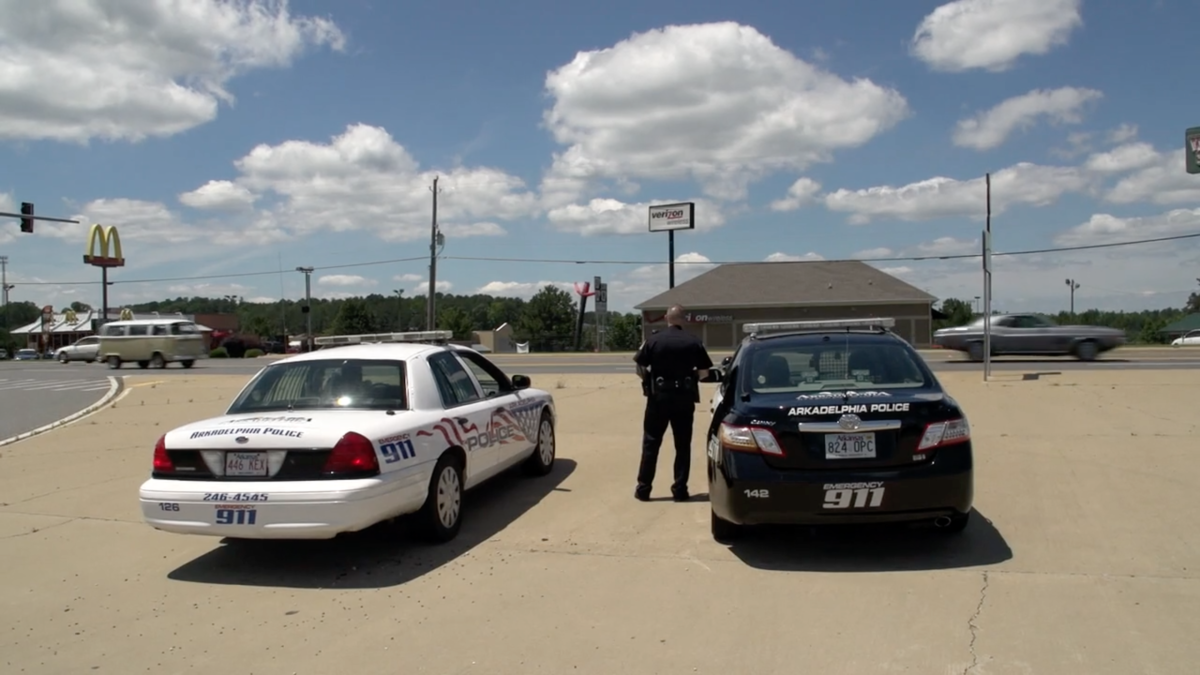When filmmakers dream of scoring prestigious screenings, the names that pop in their minds tend to be Cannes, Toronto or Sundance.
Not in Detroit. And not at a car show.
But an Arizona State University professor couldn’t be happier that his short film is being screened today at the 2016 North American International Auto Show in Detroit.
Peter Byck’s “Hybrid Law” is about a small-town police department in Arkansas, which awkwardly, but lovingly, embraced a new fleet of Toyota Camry hybrid patrol cars. It is being screened in Detroit by Toyota.
“We didn’t make this for Toyota,” Byck said. “We didn’t even know they were driving Toyotas.”
Byck, a professor of practice in both the School of Sustainability and the Walter Cronkite School of Journalism and Mass Communication, is the director, writer and producer of “Carbon Nation,” an acclaimed 2010 documentary about climate-change solutions. “Hybrid Law” is part of a series of short films being created by Byck promoting a low-carbon economy. They are being produced in affiliation with ASU.
“Hybrid Law” paints a picture of a traditional small American town where the police love their traditions, but come to appreciate something very new.
Sergeant Don Cleek and Officer Kevin Yeagle of the Arkadelphia, Arkansas, Police Department, stand by their patrol cars — a Crown Victoria and a Camry hybrid — at the beginning of the film.
“He’s got the modern submachine gun, and the modern Toyota car,” Cleek said in his police uniform. “He carries a modern Glock. I drive a good old American V-8 with a rear wheel and a full frame like they were meant to be, (I carry) a wood and steel rifle, like they were meant to be, and a 1911 that was designed in 1911 by John Moses Browning. I’m old. He’s young.”
Yeagle, driving his hybrid, admits he enjoys it.
“I’ve gotten a few snickers, of course, when I tell friends at other departments what I’m driving,” he said. “I don’t want to make myself out to be a green energy person, either. About as far as I’ve gone with that is I hate littering.”
Asked by Byck if he’d go back to driving a Crown Vic, Yeagle simply said, “No.”
Byck was screening “Carbon Nation” in Fayetteville, Arkansas, when someone mentioned the small-town police department that embraced hybrid cars — and was doing a better job because of it.
“I thought, ‘Wow. What a story,’ ” Byck said.
After the police chief and city manager both agreed to the filming, Byck spent two days in the central Arkansas town, with a population of about 10,000.
“I knew when I was filming it, ‘This is really good. They have a good story,’ ” Byck said. “It’s a positive story, and it’s one of those stories we hunt for in our Carbon Nation work — show me good money-saving ways to be cleaner. Those are the stories we hunt for. We hunt for good characters.”
“The only noise you’re going to hear is the tires crunching on the gravel.”
— Arkadelphia Police Chief Al Harris
Initially the cars were not an easy sell to either the rank and file or management.
“When I first heard about the Camrys they were going to order, I was dead set against it,” Cleek said. “Police cars are supposed to be rear-wheel drive, and V-8s, and a lot of room, and be able to go through ditches and stuff.”
“I just dismissed it,” Police Chief Al Harris said. “All I thought was they’re small and don’t have any power.”
Then he and city manager Jimmy Bolt went for test drives.
“One, they’re not little, and two, the performance is a lot better than I’d given them credit for,” Harris said.
The effects of the switch were evident, too.
By replacing 10 Crown Victorias with 10 Toyota Camry hybrids, the department increased patrols, decreased maintenance and cut down so much on fuel that the entire city staff enjoyed a 3 percent wage increase. One officer said he has gone from filling up his gas tank twice per shift to once.
There was even a benefit no one saw coming, and that some still don’t.
“The only noise you’re going to hear is the tires crunching on the gravel,” Harris said. “We call it the stealth mode. You can literally be on top of something before the bad guys realize you’re there.”
The film shows that people are coming on board with green living outside of San Francisco or San Jose.
“This idea that early adoption is owned by the coasts is just wrong,” Byck said. “That’s why this story works so well — because it’s unexpected. I’m seeing innovation and early adoption everywhere. It’s just not known yet. … We’ve got to tell those stories more and more and more. It shouldn’t be thought of as a place of early adoption. It should be celebrated.”
And in Arkadelphia, Arkansas, it is.
“We all want to do right by our world we live in,” Bolt said. “Green is popular, but it also has to be practical.”
The image at the top of this page is a screen shot from Peter Byck's film "Hybrid Law."
More Environment and sustainability

Rethinking Water West conference explores sustainable solutions
How do you secure a future with clean, affordable water for fast-growing populations in places that are contending with unending drought, rising heat and a lot of outdated water supply infrastructure…
Meet the young students who designed an ocean-cleaning robot
A classroom in the middle of the Sonoran Desert might be the last place you’d expect to find ocean research — but that’s exactly what’s happening at Harvest Preparatory Academy in Yuma, Arizona.…

From ASU to the Amazon: Student bridges communities with solar canoe project
While Elizabeth Swanson Andi’s peers were lining up to collect their diplomas at the fall 2018 graduation ceremony at Arizona State University, she was on a plane headed to the Amazon rainforest in…


